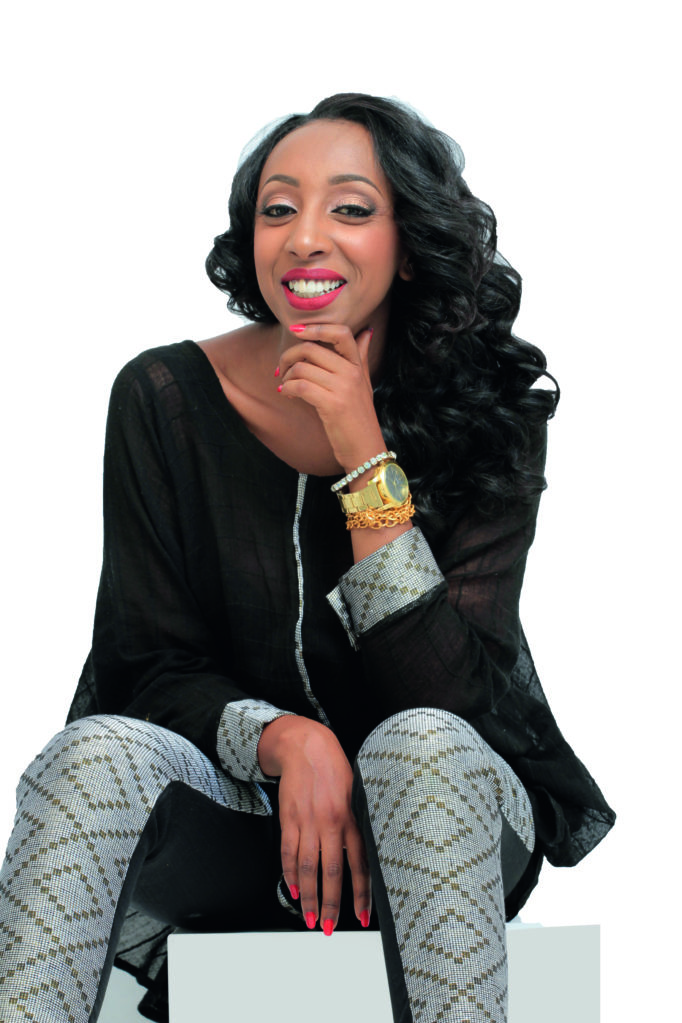Mahlet Afework is yet to arrive. Her shop, Mafi, in a busy commercial complex opposite Edna Mall on the arterial Cameroon Street in Addis Ababa is a white oasis. A slim-waisted shop attendant behind a white desk informs that Mafi – also her boss’ nickname – is on her way.
It allows sufficient time for first impressions – summery hand-woven white tops and tunics with colorful Ethiopian prints on the racks, but the best way to assess a designer’s innate talent is – always – her shop itself.
In Mafi’s case, turn your gaze towards the ceiling. A small leafless tree, branches painted white, is fastened to it, intertwined with white bulbs. Mafi, trim, trendy, dressed in white and with lime green fingernails, walks in a minute later, and explains the origin of this aerial art work.

“That was an old tree trunk I found discarded in a friend’s house. Didn’t want to leave it that way, so converted it into a chandelier,” she offers.
In many ways, as you learn later, it is a metaphor for Mafi’s own life. What would have been wasted was spruced, primed and put to use.
At first glance, this fashion designer with a raving clientele amongst Addis Ababa’s swish set represents the new wave of young Ethiopian businesswomen making a mark on the country’s creative conscience.
Mafi is smart, articulate and possesses a sound knowledge of her industry – she knows its inner workings from the air-conditioned malls of Addis Ababa to the bustling bazaars of Mercato and the rural villages of Dorze, 500 kilometers from the city, from where she sometimes sources her fabrics, weavers and ideas.
She talks about her fashion outings on the ramps in New York. She revels in branded Western wear, but laments they are not easily available – as yet – in the malls in Addis Ababa. She is a daring disciple of the latest fashion fads, she has a TEDtalk under her stylish belt, and like most young people in the city, is grateful for her freedom.
You ask her how it all started, and then you get a different picture. Her success and the lifestyle trappings in her store acquire another dimension: the white décor looks like empty spaces she wants to fill. It is never too easy for a woman, and for a 26-year-old at that, to have come this far. She must have started early. Really early.
She was only eight, the youngest of five children, when her mother left them for Israel for medical treatment. A year later, sadly, their father passed away. And her mother?
“She never came back,” says Mafi, her almond eyes finally welling up. She never came back – until Mafi turned 18.
Before tragedy struck, it was a good life. Her father worked hard, he sent the children to private school and family get-togethers were fun-filled.
“But all of a sudden, nobody came to visit us…It was difficult,” says Mafi. “The one thing we learnt was responsibility. We didn’t get spoilt. I started working at the age of 16. By the time I met my mother again, I was already a designer.”
She is not willing to divulge the details of what kept her mother in Israel: she lets on that she may have not had legal travel documents or that she was working as a housemaid, and didn’t have the means, although she consistently sent the children money, including “pocket money” for her youngest child.
“I don’t usually talk about that part of my life, but my mother is my hero. I totally get the situation she was in, and am always thankful for her,” says Mafi.
While still in school, Mafi was swayed by Hollywood hip-hop and took to rap music.
“Ethiopia is traditional, and there were few rappers in Addis, let alone female rappers. I saw the gap and decided to become one. I was very active in school. Then we released a single, called Shalom Africa, when I was in grade 9. The radio stations in Addis Ababa played our music.”
And Mafi got noticed. Yosef Gebre Jossy, the famous recording artiste in Addis Ababa, asked her to record an album with him. She said yes, and also told him she could design clothes for his music video, Jossy In Z House. From her tiny room at home, the schoolgirl designed jackets, shorts and skirts for the artistes. The young girl would leave home early in the morning, to source fabrics from the crowded Mercato market, bringing reams of cotton home – on her own.
Thereafter, Mafi studied nursing for two years – “as there were no fashion schools in Ethiopia” – but subsequently left it midway as her heart was not in it.
“While I was studying, I got famous and couldn’t go to college because people would recognize me in the taxi station. And I didn’t have enough money to buy a car. So I decided to make money. I have done 15-30 fashion shows in Addis Ababa over the last three years.”
For her designs, Mafi draws inspiration from her country’s rich culture. For her ‘Last Resort’ collection that she showed in New York, she used the Axum obelisk as a motif. She is currently working towards opening an online store for the international market.

“We have a huge diaspora community in the US. I am now thinking of export. I want to hire more weavers, and make more money as I have responsibilities towards my workers as well. This year will be different,” she says, adding she made Birr 1 million (about $50,000) over the last nine months.
“Everyday, I find something interesting to do,” she says, as we step out into the hot Ethiopian sun, and she dabs on pink lipstick and puts her shades on. Mafi is ready to roll.
